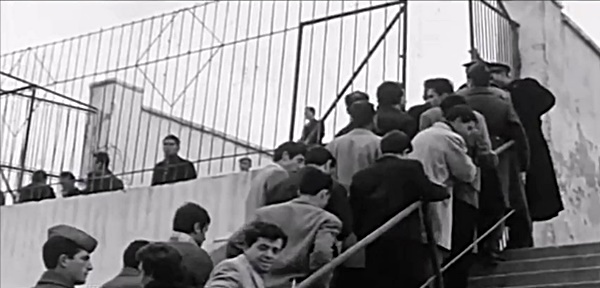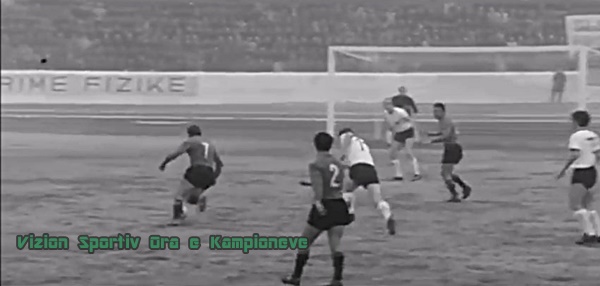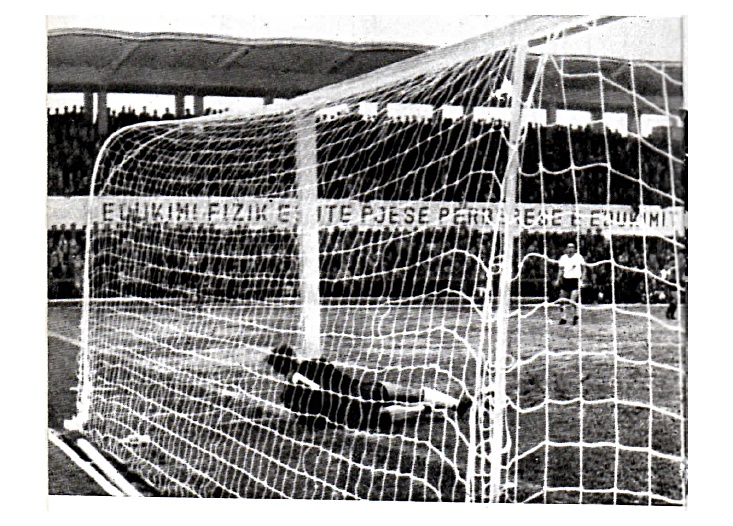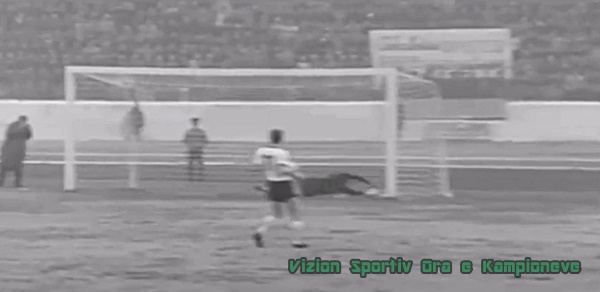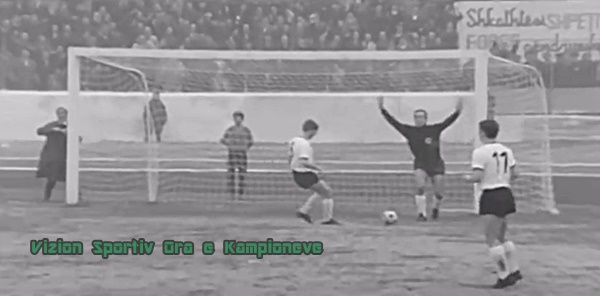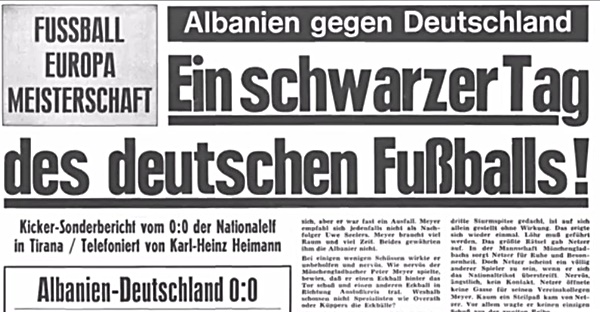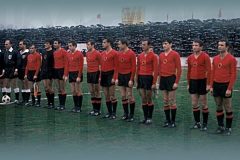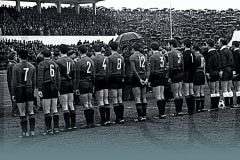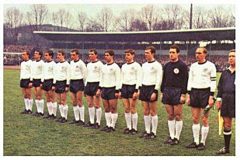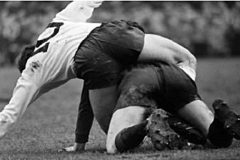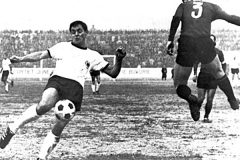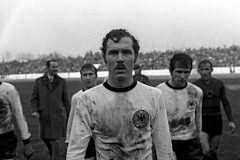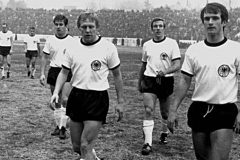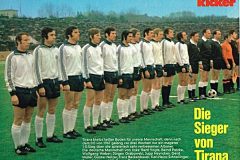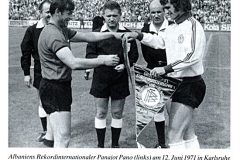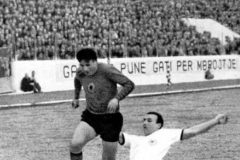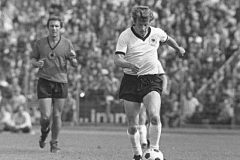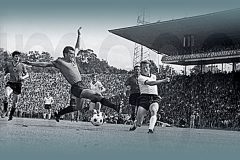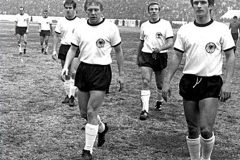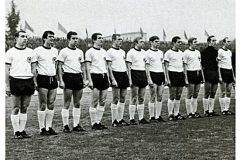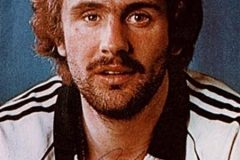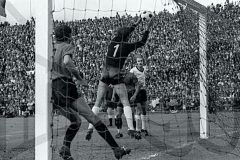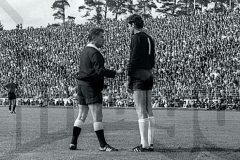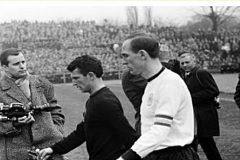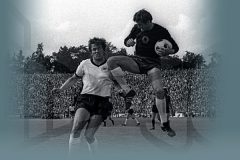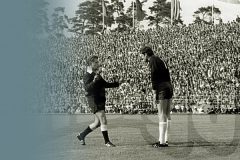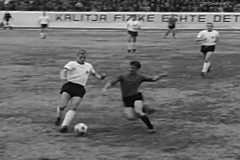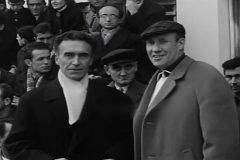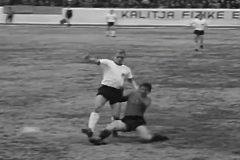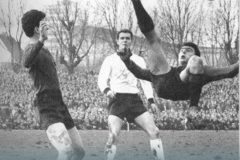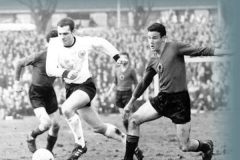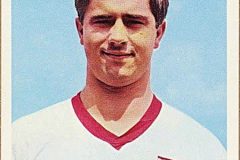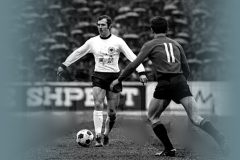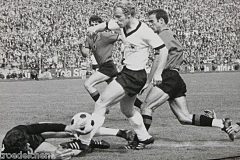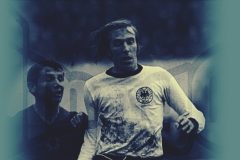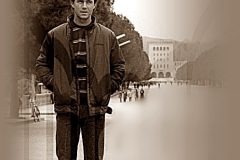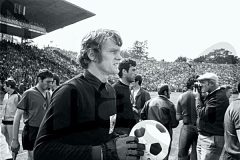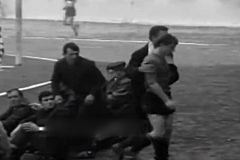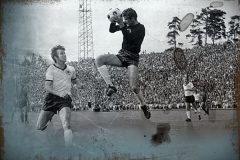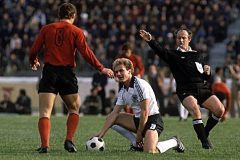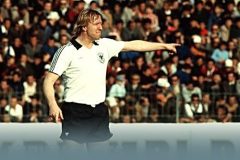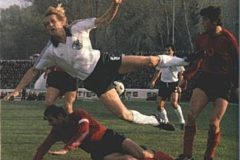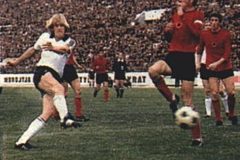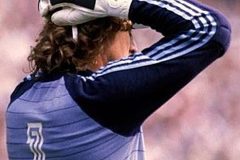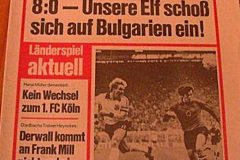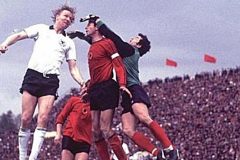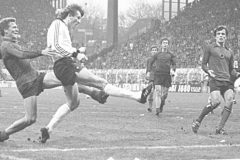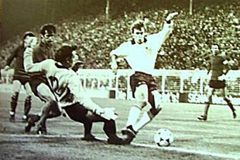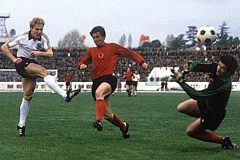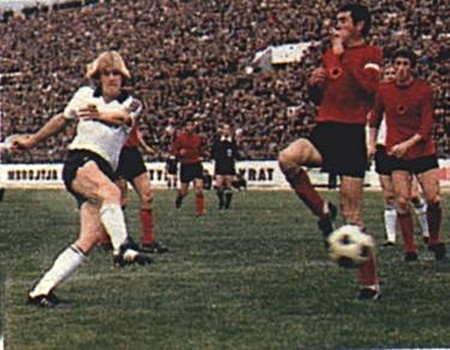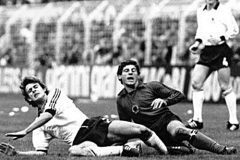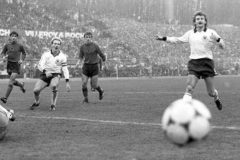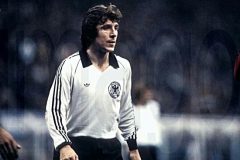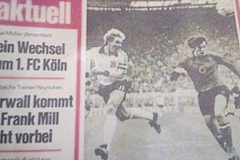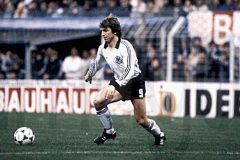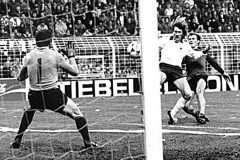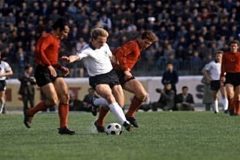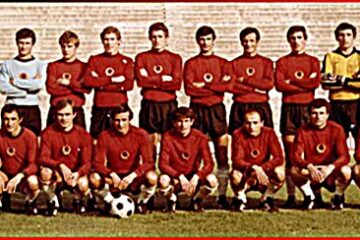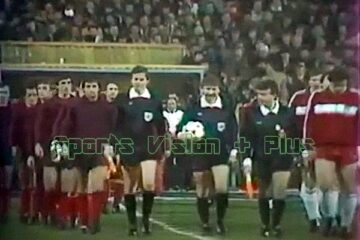(1967 – 1981) | We and Germany!
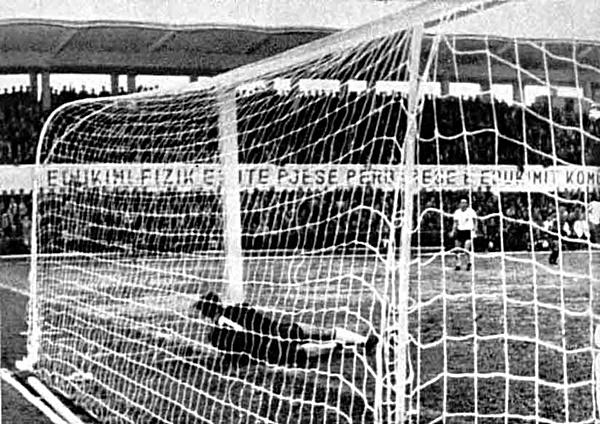
1
“Pandora’s Box”
Dortmund, April 8, 1967 Only 23 years have passed since the war. Germany no longer exists because it is now divided into two states, the Federal Republic of Germany or West Germany and the German Democratic Republic or East Germany. That which under the name “Western” continues to be part of democratic Europe and that “Democratic” which is part of the communist influence imposed by force from the Soviet Union. It is the Federal Republic of Germany that will write a brilliant history in football for 45 years, being the superpower of Europe as well as Brazil’s strongest competitor in the world. Democratic Germany is the one that has defeated the Federal one 0-1! In the only match that was recorded in history, in the only world in which the Democratic Germany participated and it was the only loss for the Westerners in that world which in the end was won by the West or the Federal Republic of Germany. What a headache for journalists, the media, people in general when they referred to a state divided into two parts, with two different names, even with two names for each state! FRG – Federal Republic of Germany or West Germany (West Germany) and GDR – German Democratic Republic or East Germany (East Germany). In fact, the most used version was that of the German language, DDR (Deutsche Demokratische Republic) The Federal Republic of Germany, FRG, as we used to refer to it for short in Albanian, for the first time, was allowed to participate in an international activity, in Switzerland World Championship, 1954 and, from the first participation, won the title.
For their opponents, the absolute favorites of the tournament, Hungary, the loss in that final, constitutes to this day the greatest pain and one of the most incredible events in the history of world football. For the Germans, that victory remains in their history as “Nation Day”! In many ways, Germany’s message to the world of football was clear from the start! Twelve years after that final, Federal Germany is again in the final for the title of World Champion. It’s the famous final against England at Wembley in 1966. Indeed, it is the Germans who have the special knack of giving fame like no other to their matches among major competitions and, for the sake of truth, Federal Germany , or the West, or the FRGj of the 1966 final, was the real beginning of Germany’s history in world and European football. The year 1954 remains an isolated flash. The generation of Fritz Walter, Toni Turek or Helmut Rahn is a generation associated only with that title. From the generation of the 1966 final, six years later in 1972, players like – Beckenbauer, Sep Majer, Schnelinger, Hoetges, Overat, Grabovski, with the same coach, would be declared European Champions and then, in 1974, they would be declared World Champions. who laid the foundations of that great story, Helmut Schon!
Well, this team or this Germany was drawn in front of our national team in the distant year 1967! It is from then that the chapter “We and Germany” begins. The draw pits us against them seven times or, 14 games in total. They are not few, they are more than with any other team! They start as the Federal Republic of Germany or FRGJ or West Germany towards the People’s Socialist Republic of Albania in 1967 and at the moment they stopped in 2001 as Albania towards Germany! In that first match in Dortmund, Albania comes without much experience in matches against Western teams. Her experience in international football is summed up in matches against teams from the Eastern bloc of Europe. However, it is not a regular team in participation among the qualifiers of international competitions. There is an excellent generation of footballers and it tries to get involved in the footballing life of Europe in the 60s.
The Albania of the 60s has massiveness in football, a strong championship because now, between Partizan and Dinamo, the protagonist is also Tirana, there are football clubs of a sufficiently satisfactory level. The national team is still fragile, it has not been consolidated yet. At its head is the great Loro Boriçi.
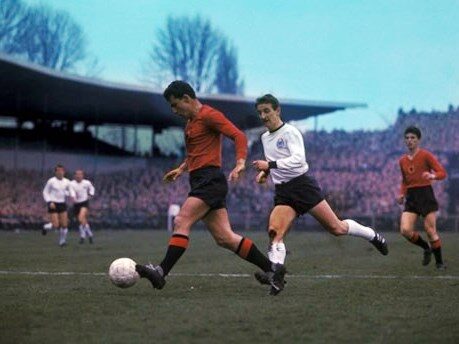
That cloudy afternoon was the background to the first match between us and the Germans. It was also the first match for both teams for the European Football Championship qualifiers as well as Gerd Müller’s first match with “die Nationalmanschaft”, as the German national football team is called. Germany field almost the same team as the Wembley final a year ago. They are; Tilkowski, Patzke, Höttges, Beckenbauer, W. Schulz, W. Weber, B. Dörfel, Ulsaß, G. Müller, Overath, Löhr. In front of them are ours with Mikel Janku, Fatmir Frasheri, Ali Mema, Teodor Vaso, Ramazan Rragami, Josif Kazanxhi, Niko Xhacka, Sabah Bizi, Skënder Hyka, Panajot Pano, Bahri Ishka.
Most of the legendary names of Albanian football today, but, so, breakable that April afternoon in 1967 in Dortmund. The Germans win 6-0! Among others are the first four goals for Gerd Müller with the German shirt. Everything seemed to be so easy for the Germans! The square of the Albanian goal, during the last fifteen minutes, resembled a box which the Germans easily opened whenever they wanted!
Yes! Albania seemed to be a small team which, like all small teams, falls easily. This is exactly where the Germans were wrong! Even today, Albania is characterized as a team that, if you underestimate, “makes it bad”! Yes! At first glance, its gate, that box that was not supposed to be opened, gave the impression that it had been given to the Germans as a gift, but…
Time would show that, if it looked like a gift to them, to the Germans, it gift would be like “Pandora’s Box”!
2.
#KombetarjaKuq-Zi #ShqiperiRFGj1967 #PanajotPano
“Die Schmach von Tirana”
For us, it will remain in history as the “Match of the century”! For them, if not “Shame of the century”, it will remain as “Shame of Tirana”!
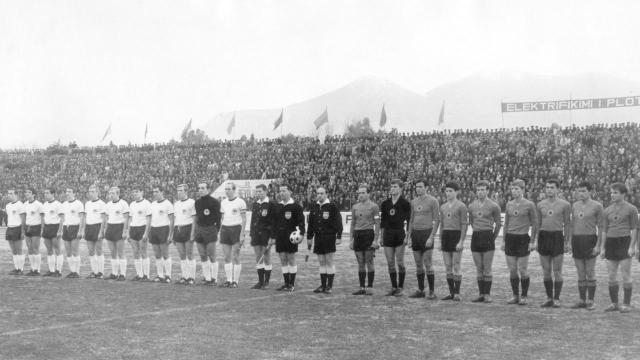
As for Albania in its first visit to Germany eight months ago, in April also for Germany its first time in Albania will be a gloomy afternoon. They are not the same formation as that of the match in Dortmund, which perhaps proves a sense of superiority and undervaluation of them towards us. For them, it’s a visit…more like a visit to the moon than to a country within the same continent! Quiet on the streets. Everywhere there were bicycles, men without beards and long hair, and political slogans on the walls, designs where the most conspicuous were pickaxes and rifles. Then, soldiers, officers, military students and not infrequently small military cars on the road. The dictatorship of the proletariat in all its glory! Two years before the arrival of Germany, George Best wondered what exactly we were protecting from the world with such fanaticism?!
He had noticed these of course and the only thing he hadn’t noticed was the large presence of people in the stadium, their enthusiasm that was reflected on the field with the enthusiasm of the Albanian players. Ireland came out with a 1-1 draw from Albania and did not enter where they wanted. In the world championship of England 1966. Germany has already arrived, two years after Ireland. For the stars of West German football, Vili Schulz, Wolfgang Overat, Gynter Netzer or Horst Dieter Hotges, it is just a routine trip. Something that has to be done and, it is enough to do even half with zero for Germany. At the same time, the strategist Helmut Shën may have already prepared the words that are said for courtesy after the match while shaking hands with the opposing coach. They are the RF of Germany.
The new superpower of football, the runners-up of the world who aim without any compunction at the World Cup. You see them and understand that they feel like world champions. The Germans came to the field of “Qemal Stafa” to get the victory that would lead them to the first European Championship, that of Italy in 1968. Inside that seemingly small stadium, there is a big world! 28,000 people from 15,000 which is the capacity! In front of them on the field, 11 players playing for national pride, to repay that 6-0 eight months ago. On the bench, Helmut Shën certainly doesn’t play the game for glory, but he’s already starting to feel colder than he really is that afternoon in Tirana. He knows that Loro Boriçi is an excellent trainer. But he doesn’t know that everything means for a trainer to make self-criticism publicly! I don’t even know that in a match that weighs so much, coach Loro Boriçi will put on the field a goalkeeper, Koço Dinella, only 20 years old and a debutant for Albania! Who would dare to think? Do something like that? On the field, the brain of the team, the one who executes Loro’s schemes on the field is called Sabah Bizi and he is only 21 years old! On the stairs, 28 thousand people with their ovations have turned the stadium into a volcano. Something that has nothing to do with what the Germans have seen and experienced since landing in Rinas until the time of the match in Tirana. No one sits between the steps. All on their feet and where the spectators were supposed to end…three more queues begin that seem to stand on the heads of others. On top of everything, the giant banner “Complete Electrification of the Village in 1971 is a great work of the Party”! Normally, Albanian fans, after three games played and 10 goals conceded, would expect electrification, but surprisingly… they are many in number, 28,000!
Of course, they are not sure that a victory will come, but with indescribable ovations they support and cheer the boys wearing red jerseys! The boys in red, play for them, play for pride! Either way, the Germans are confused. They don’t have flagrant cases even though they are in the attack. Maybe because the coach Saint made the mistake of putting two fantasy players together, Netzer and Overat, but Meyer, the best scorer in the Bundesliga, had promised to score in Tirana… It was that pressure that doesn’t bear fruit if you play even a week and as Vili Shulc would say years later “they could not find the key to open the Albanian box”! That box they opened so easily eight months ago!… Hotges and Shulc can’t help the attack. In front of them are Panajo Panon on a big day. He is the only Albanian in the attack!
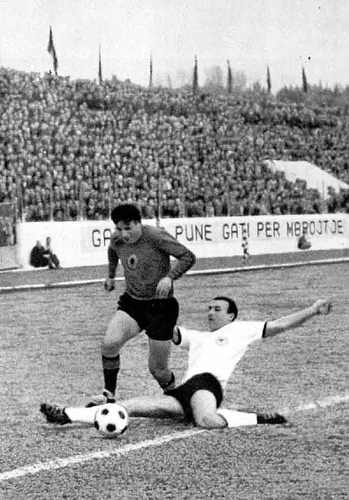
It is everywhere where the ball is and it seems that there are two or three of them on the field! Vili Shulc cannot stop him. In a case that already belongs to history, Pano walks forward with the ball moving the middle as if he is going to move to the left but is released to the right, Shulc takes two or three steps back and falls to the right. The stadium explodes! Shulc, without getting up well, jumps furiously with both feet at Panos, but he runs away, leaving him lying down to see the number 7 on the shirt!
The second half begins with Panon in the center who without much effort avoids with class, leaving Overat and Hotges on the ground. If you refer to the body language, it is translated in this way: The Germans start furiously to fight with all the means, but Albania without any complex would continue to play beautifully and even more threatening than the first half! As the sky darkens, the situation in the stadium becomes electrified. Albania from the stairs of the stadium, from the televisions that were counted with fingers maybe and from the radios did not believe their eyes and ears for what they heard and saw! It is an open battle and the ball sometimes goes to one side and sometimes to the other. The Germans want victory at any cost!
The Albanians, for their part, already believe that they can get the victory and they are all ready to leave their souls on the field, starting with Todi Vasi, who was seriously injured and who initially refused to leave the game. His exit leaves Albania with one less player, but this is not felt on the field. Just like it wouldn’t feel in a hand to hand battle! It is the only match where Albania sees its boys on the field fighting like Albanians! It’s the last battle but… it’s the mother of all battles! Din Zhega, like everyone else, prioritizes defense and knows how to fight when and where he needs to in midfield and defense.
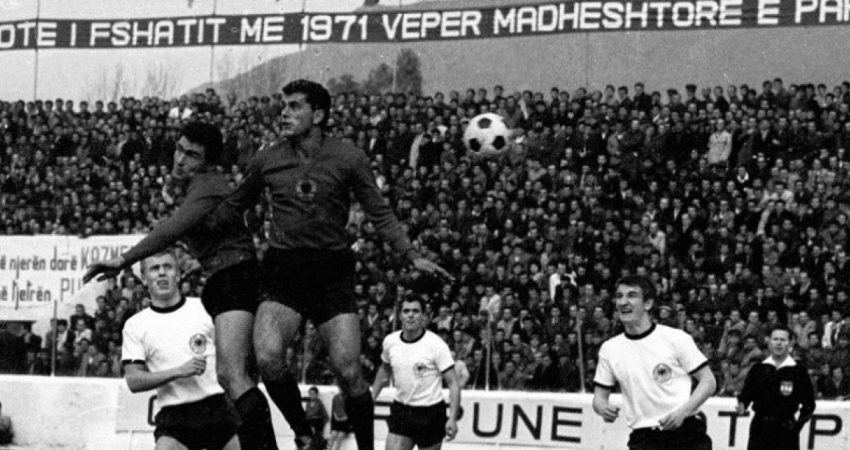
Rramazan Rragami does not lose a single ball in the air or on the ground. The trio of Vllaznia on the field raised Albania to another level from what it was in Dortmund. Ali Mema and Josif Kazanxhi are in a good day, just like in the good days on November 17 of the last years. But above all, Lini stands out. Lin Shllaku! This man played the game of his life. He was the undisputed hero of the National Team that day, the lion who came forward from anywhere, in every corner of the field. Whoever was in the stadium that day, remembers Shllak’s extraordinary performance and Fredi Jorgaq’s two shots. The first one is punched by goalkeeper Wolter after the ball crossed the fatal line!
The second goes a few centimeters above the triangle, shocking the world runners-up even worse. The match ended in a 0-0 draw. West Germany should have felt lucky to come away with a draw from the Cemal Stafa Stadium but, like Northern Ireland two years earlier, they failed to reach where they aimed – the finals of the 1968 European Championship in Italy.
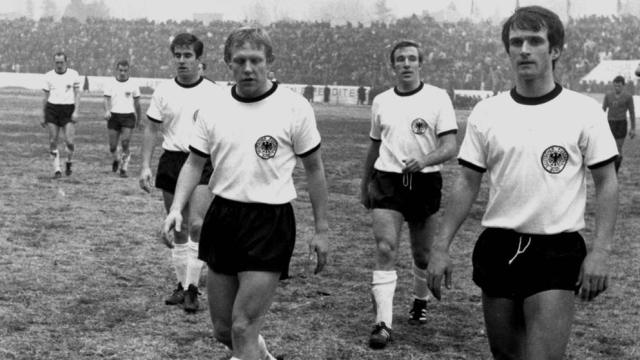
It was heard from nervous Germans that the Albanians played so well and so determined to help Yugoslavia (which, after this result, qualified for the final). From our side, we still hear the complaint that it was incomprehensible that an Austrian was leading that important match of the German RF. Even this one, the Austrian Ferdinand Marshall, answered the Albanian complaint about why he denied the goal, “what does it matter? With or without that goal, you left the Germans out!”
After the match, many people entered the field to hug their heroes! The Albanians celebrated the draw like crazy and this was incomprehensible to the Germans as much as it was understandable that those celebrating on the field with the players were not Yugoslavs! One way of celebrating on the steps of “Qemal Stafa” was the lighting of pieces of newspapers, a sight that today brings to mind concerts or celebrations in stadiums with lights off and thousands of mobile phones on! After the match, Helmut Shën expressed himself with the best words for his colleague Loro Boriçi. Of course, that was a lot more words than he had intended to say before the match started. After that humiliating 6-0 defeat in Germany, we took the hack to knock out the German team. To this day, it remains one of their three footballing embarrassments along with the 0-1 loss to East Germany in the 1974 World Cup and the 2-3 loss to Austria in the 1978 World Cup in Argentina.
After that draw, we haven’t managed to get a single point from the Germans. They always hit us hard and often at the last minute! So often that we cursed the God of football like few! We only hit once but…they still hurt!
3.
A goal by Gerd Müller
This was the only difference between the two teams.
The goal!
Big difference in football. Let’s not forget, football is a sport where the best does not always win! They are the qualifiers for the European Championship of Belgium 1972. We are in group 8 which consists of the Germans, Poland, and Turkey. The Germans and Poland, together with the Netherlands, will be the main protagonists of the World Cup in three years.
In the first match in the group, Germany made a mistake at home, leaving a draw with Turkey. As it later proved, the German RF, eliminated during the “Battle of the Century” in the “Azteca” of Mexico, by Italy in the semi-finals, would be the team that would reign in Europe and the world in 1972, 1974 and n/champions Europe in 1976. Four years have passed since the last clash with Germany’s RF in Tirana. In these four years, our national team has played only one away match, against Poland, a 3-0 defeat, on October 14, 1970. And while the German RF is still a world superpower, we, thanks to the incomprehensible decisions of our government, at the moment more beautiful, when we had just created a good national team, we deprived ourselves of participation in international competitions, losing a lot of experience.
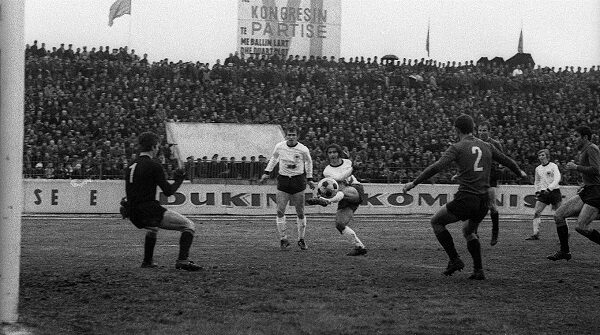
From the 1967 epic against the Germans, Dinella, Vaso, Rragami, Bizi and Pano are part of our team. Iljaz Çeço, Ziu, Dhales, Gjika, Cani and Gëzim Kasmi are the other six chosen from a championship that, as it comes and balances, becomes even more beautiful. The Germans definitely need the points. Apart from the victory in Tirana, any other option is not accepted! For this, Helmut Shën, who is afraid of Albania, chooses the best possible team. Apart from the victory in Tirana, any other option is not accepted! Six of the players in the “Cemal Staff” will be in the historic final three years later in Munich against the Netherlands. Sepp Majer, Berti Vogst, Franz Beckenbauer, Wolfgang Overat, Jurgen Grabovski, Gerd Myler, and Jup Haynkes together with Weber, Patzke, Netzer and Overat who were in Tirana four years ago.
Another big name was added to them, Karl Heinz Schnellinger in his last match with the German RF National Team. Would it be an impossible mission for Loro Boric? Or, would it be another failure for Helmut Schoene?
It was a question to which there could be no answer. Because, the last time it proved that Albania did not ask for names, in its field it was not afraid of anyone. on the contrary, the Germans were afraid of us. Their star Franz Beckenbauer, as if under an “alter ego”, appears with a mustache look like never before, as if he wanted to give himself more manliness and courage. In both camps, there are more silences than statements. The hour of the battle of Tirana had arrived! It was supposed to be a battle because both teams, each for their own reasons, were expected to give their best on the field.

It was the latter that was proven. Both teams gave their best on the field, but Albania was always looking for a goal. Pano was the same as four years ago. even at the beginning of the match he makes the same double dribble, as at the start of the second half in 1967. Overat and Grabovski are victims again. From the beginning of the match, Ziu after an incursion shoots strongly tokazi and Majer waits in two times. In this match, Jorgaqi and his shots from four years ago are really missing, but Albania on the field, at every opportunity “bombards” the German goal with shots from different distances. The secret ace up the sleeve of Loro but also of Ilia Shuka, the assistant coach, was Ziu. He, from the defender of the left wing, turned into an attacker, tiring the Germans quite a bit. The same thing Jurgen Klopp does today with Robertson and Alexander Arnold at Liverpool. Helmut Saint does not have any surprises to present. The only hope lies in the bomber of German football, Gerd Müller. It is precisely him who is stolen from our defense for the second time, specifically his marker Bujar Canit. The first time he warns with a parabola-shaped header that ends above the crossbar.
The second time, in the same place, after Grabovski’s cross from the left of the German attack, Myler strangely stops the ball in the air with the left part of his face and then, with a left turn, sends it into the corner of Dinella’s goal. . It’s the 34th minute. The German RF breathes! Apart from a Grabovski shot which Dinella blocks without much trouble, everything else was talking about Albania. It was said to be the goal that would give the verdict of the match! In the second half, Albania is constant in attack. In the end, Albania came to the field to win and not to defend. This was the big change in her game compared to four years ago! The Germans fight…as they know how, but, more on the defensive. Berti Vogst, Schnelinger and Weber have a lot of work.
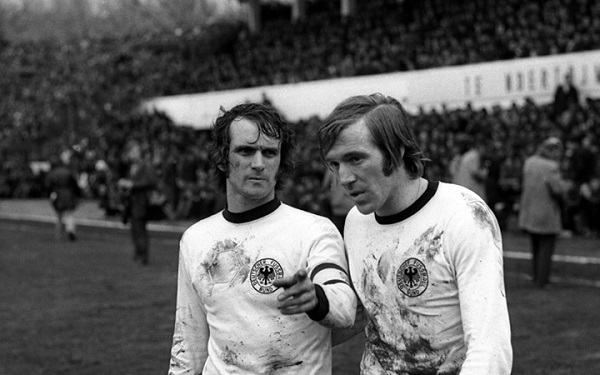
In the smallest case, they selflessly throw themselves at the feet of Pano, Çeço, Biz or Ziu. Beckenbauer runs and is everywhere on the field and Sepp Majeri, the next legend in the German goal, takes care of the rest! It was indeed a busy day for him. In that wet terrain, no crossing escapes. The rain was also present to give a special tone to this “battle”. Mayer again saves the Germans from a strong shot inside the Ziu area. In another case, after a cross, Beckenbauer does not head well and the ball goes parallel to the goal, not far from Biz, but he cannot push it into the net.
As much as Albania pressures all the time, the German defense and Majeri manage the result and the German RF wins 0-1. After the match, all the statements of the Germans and their press are actually compliments. Gerd Myler – “It was a difficult match! This result makes the day beautiful and I feel happy that I scored today” Helmut Saint, once again does not spare the praises for the great Loro – “I want to give him the best compliments to my colleague Boriçi. He has raised the level of his team. Although we won, the Albanians did not score more than us. If you continue to play like this, every team in Europe he’ll have a hard time matching you!” In the German press it reads – “We can say that today’s victory was one of the luckiest victories since the Second World War. The Albanians had the upper hand throughout the game. Without a doubt, they deserved to get more.” “Without bomber Myler, we won’t go anywhere! He is a special man who is affirming himself as the right choice for the Albanians!” It was the first and last time that Albania entered the field as equals with the Germans, with the clear intention of winning. During those qualifiers, the German team was stronger off the field, beating Poland 1-3 and Turkey 0-3, which speaks volumes for that dramatic victory in Tirana.
The beautiful team that Loro Boriçi and Ilia Shuke had built, in the other two matches in Tirana, got a 1-1 draw against Poland and a spectacular victory against Turkey 3-0! Helmut Shën’s words were simply confirmed – If you continue to play like this, every team in Europe will find it difficult to match you!” After the elimination matches of this group, Albania…retired again, for eight years from the eliminators for the next competitions. He would return again in 1980 and in the group, the draw would again put him in front of the German RF.
4.
“Restart”
In the sense that the National Team will return to play for World and European qualifiers after ten years. Also, that we were going to face Germany, it was like starting where we left off ten years ago from the last time.
We were with them in a group, we withdrew from the international matches and when we came back, we found ourselves in the group again with Germans.
Albania
In fact, things have changed a lot inside Albania. Championship, his level too. The Dynamo cycle of the famous trio Ballgjini – Zëri – Përnaska has just ended. Partizan of Bejkush Birçe is the champion of the country, next is Tirana of the 80s but also Vllaznia. It is the change of decades which begins with the end of a great national team. The team that ended the qualifiers with a 3-0 victory over Turkey, had the misfortune of not participating in international activities for the next ten years. Thus, the end for two great Albanian football stars like Sabah Bizi and Iljaz Çeço, while a bomber like Ilir Përnaska spent ten years without a national team! The last match of the national team in Tirana, on November 14, 1971, was one of the most beautiful days of Pérnaska’s career. Scored two goals in the 3-0 victory over Turkey. He was only 20 years old! The national team descends on the field of “Qemal Stafa” with Jani Kaçi, Safet Berisha, Kastriot Hysi, Kujtim Çoçoli, Muhedin Targaj, Ilir Lamen, Ferdinand Lleshi, Uran Xhafa, Arben Minga, Ilir Përnaska and Shyqyri Ballgjin. Coach as always Loro Boriçi. The strong opponent of Helmut Saint and the protagonist of the great success against the German RF in 1967.
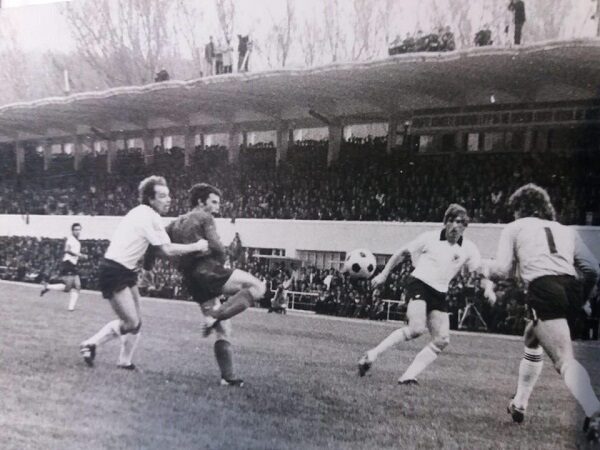
The monster!
It was exactly like that! German RF, just renewed the team. It started the decade with an all-new eleven from 1974 excluding Paul Breitner. It was the newly crowned European Championship, Italy 1980. There were “world stars” players in the full sense of the word. Their clear goal – first place in the group and World Champions after a year in Spain! On hearing their names… steppes! Shumaker, Brigel, Kalc, Dremler, the two Fërster brothers, Braitner, Shtilike, Litbarski, Fisher, Hrubesh, Allofs, the best striker in the world, Rumenige and one of the protagonist midfielders in Europe during the decade, both with Barcelona and Real Madrid, Byrd Shuster! He was the ten-year-old who started with this team as European champion in 1980, finalist of all three World Cups, to be crowned World Champion in 1990, in the same place where he started as European Champion, in Italy! If the National team of the Federal Republic of Germany was not a monster, then who else could be?!
Bicycle!
In Albania, isolated from the world, the bicycle was more important than that of a Dutchman in Amsterdam or a Chinese in Shanghai! It was a means of transportation for the family, it was love, it was also fashion! For the Shkodrans it was more than that! It was maybe… everything!
The interest in this match has been incredible! Statistics say that on April 1, 1981, 30,000 spectators were present at the “Qemal Stafa” national stadium. So 10,000 over capacity! No one can give a number of people who were left out. Since three days ago, thousands of people from Shkodran left for Tirana by trains, buses, trucks and…by bicycles! The ticket on the black market increased tenfold from three new lek to 30-35, that is, two working days. Many people who did not find a ticket, started to tempt the police by forgiving their bike! Yes, yes! Forgiving the bike and in some cases even exchanging it for ten or fifteen tickets! All these sacrifices for only 90 minutes of matches! It was overall a quiet match, without tension and without much to remember. The supremacy of the Germans was clearly visible on the field. There were only three moments that remain in memory. Shuster’s two goals and a missed penalty for Pernaska. All three of these, for quite a few people, were worth…as much as a bicycle!
Bernd Schuster
In all of Albania, it was the day of lies! For Bërd Shuster, in the full sense of the word, it was his day! Scored both of his team’s winning goals. The first spectacular, with a shot outside the area directly and the ball ends up in the triangle. On the same day, his wife, in Germany, gave birth to their first child!
Injustice.
Albania was small in European football and no one doubted that, in case of need, the Germans would have the referee on their side. The denied goal of Gjinali in 1967 by the Austrian Ferdinand Marshall was added to the missed penalty of Pernaska in this match. Pérnaska has left behind the central defender Bernhard Dietz and inside the area he is facing the goalkeeper Shchumacher. Immediately Dietz pulls him by the hand and by the shirt, preventing him from hitting the ball and…for the referee Antonin Vencl from Czechoslovakia, everything is fine! The first goal against the German RF would be delayed for another two years. It would be scored right from the penalty spot!
Continues with Part 2 (1983-1997)
By: Arian Muraj | (C) Alright Reserved
____________________
Sports Vision+ / The Hour of The Champions in activity since 2013
Photos: Courtesy of Google . If you have any issue on our photos, please contact us first before you make any report. Thanks!
Follow us:
Facebook: https://www.facebook.com/VizionSportiv
Dailymotion: https://www.dailymotion.com/kinetografiashqiptareartisporti
Blog: https://pierosportvision.blogspot.com/
Discover more from Sports Vision +
Subscribe to get the latest posts sent to your email.

